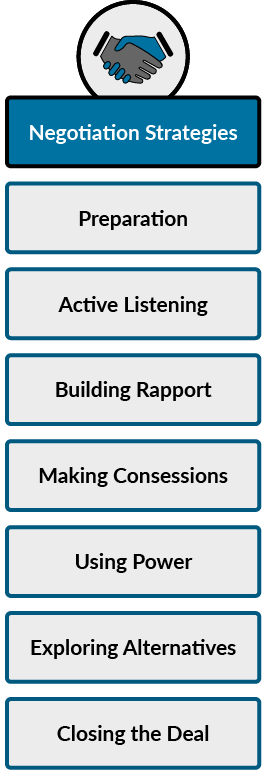Negotiation Strategies
It is essential to keep in mind that when negotiating with someone, their objectives may differ from yours. They may prioritize different issues or desire a distinct outcome. Understanding their goals is crucial to reach an agreement successfully. Various negotiation strategies exist, but not all of them may be suitable for a particular situation. It’s crucial to select the appropriate strategy based on the specific circumstances at hand.
There are several strategies for negotiation that can be used to achieve a favorable outcome. Here are some of the most commonly used strategies:

- Preparation:
Before entering a negotiation, it is important to do your research and gather as much information as possible about the other party, their needs and interests, and the market conditions. This will help you develop a strategy and set realistic goals.
- Active Listening:
It is important to carefully listen to the other party and understand their perspective. By actively listening, you can identify areas of common ground and potential solutions that can benefit both parties.
- Building Rapport:
Building a positive relationship with the other party can help establish trust and create a more collaborative atmosphere. This can be achieved through small talk, sharing personal stories, and finding common interests.
- Making Concessions:
Negotiation often involves making compromises and concessions. It is important to identify areas where you are willing to make concessions and to communicate them effectively.
- Using Power:
Power can come in many forms, including expertise, status, and resources. It is important to use power appropriately and effectively to achieve your goals without alienating the other party.
- Exploring Alternatives:
If a negotiation is not going well, it may be necessary to explore other options, such as seeking out other potential partners or pursuing alternative solutions.
- Closing the Deal:
Once an agreement has been reached, it is important to summarize the terms and confirm them in writing. This helps to avoid misunderstandings and ensures that both parties are on the same page.
These are just a few of the many strategies that can be used in negotiation. The key is to be flexible and adaptable, and to tailor your approach to the specific circumstances of each negotiation.